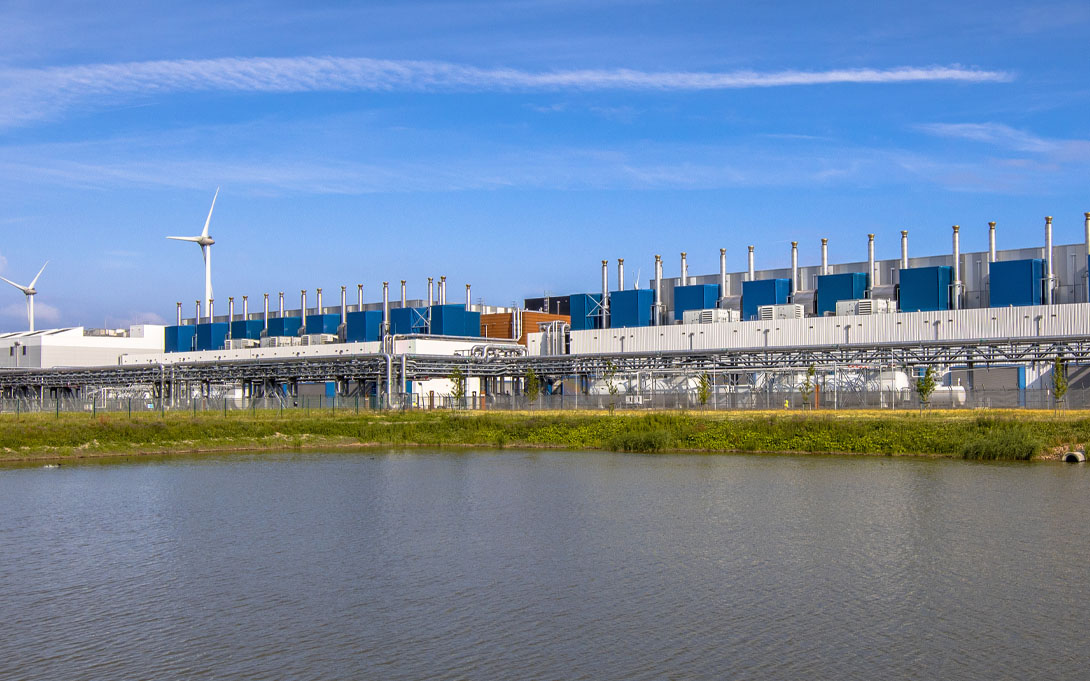
The rapid growth of data centers, with their enormous energy and water demands, requires targeted policy interventions to mitigate environmental impacts and protect local communities. A new report by the University of Michigan’s Science, Technology, and Public Policy program at the Gerald R. Ford School of Public Policy outlines steps that local and state governments can take as the pressure to build more data centers increases.
The policy recommendations are relevant to both states that have enacted tax incentives to lure data centers, as well as states that are considering those incentives.
The study, What Happens When Data Centers Come to Town?, outlines the environmental and economic impacts caused by data centers, top of which is the massive electricity consumption of up to 2 megawatt hours of power— equivalent to 2,000 homes— straining local resources and infrastructure. This massive electricity demand is matched by equally staggering water consumption, as cooling these power-hungry facilities requires vast amounts of water—some individual data centers use millions of gallons annually. That leads to increased local utility costs that are passed on to residential consumers, while the data centers can have long-term electricity deals, which contributes to pricing pressure.
The centers often prolong the use of fossil-fuel based energy production, with the concomitant effects on climate change, because there is not sufficient clean energy capacity, and there will not be without massive new investments.
Finally, tax breaks for data centers do not deliver the promised economic benefits, such as high-paying jobs, and they reduce local tax revenues, while shifting financial burdens onto communities and schools.
The study was co-authored by Ben Green, assistant professor of information and assistant professor of public policy (by courtesy), along with Terry Nguyen (BA Public Policy ‘25), with the collaboration of the Michigan Environmental Justice Coalition.
“The AI industry is aggressively touting data centers as a boon for local economies. In response, many states—including Michigan—have passed tax breaks to incentivize data center construction,” says Green. “But when you look at the evidence, it’s clear that data centers are harmful for the environment and that tax breaks are a bad deal for local communities. The growth of data centers has meant that fossil fuel plants slated for closure are staying open. Meanwhile, consumers face higher energy rates. And despite the promises of bringing tech jobs, data centers provide few long-term, high-paying jobs.”
Based on evidence from existing data centers in Georgia, Illinois, Indiana, Iowa, Michigan, Nebraska, Utah, Virginia, and Washington, the report shows that the effects of the tax breaks benefit the corporations more than local communities.
"The science is clear—now the onus is on policymakers and regulators to put people over profits and protect our communities from data center expansion. We're already seeing sacrifice zones forming around the country, from Memphis, Tennessee, to right here stateside in River Rouge and Ypsilanti, putting communities at risk,” said Chris Gilmer-Hill, policy associate with the Michigan Environmental Justice Coalition. “We need clear laws that stop utilities from giving data centers sweetheart deals on the backs of regular ratepayers, and we need binding requirements that data centers and any other large energy and water consumers operate using clean energy and without contributing to local air or water pollution. Michigan, a steward of the world's largest source of freshwater, shouldn't have to bear the economic and environmental costs to line the pockets of the wealthiest corporations in history."
For states that already have programs in place, data center tax breaks should adopt sustainable growth policies for data centers, mandating energy audits, strict performance standards, and renewable energy integration, while also requiring transparency in energy usage reporting.
States without tax breaks should avoid such incentives altogether while simultaneously implementing mandatory reporting requirements to hold data centers accountable for their environmental impact, the report recommends. Broader measures should include protecting local tax revenues for schools, regulating utility rate hikes to prevent cost-shifting to consumers, and aligning data center energy demands with state climate goals to avoid prolonging reliance on fossil fuels.
Going forward, the report points to policy solutions, including model laws, like the German Energy Efficiency Act, as well as proposals in California and Virginia. The German act prioritizes the integration of renewable energy sources and imposes strict efficiency standards on data centers, ensuring that their growth does not disproportionately burden the grid or increase reliance on non-renewable energy. U.S. states that adopt similar provisions would require data centers benefiting from tax incentives to meet high energy efficiency benchmarks, invest in on-site renewable energy systems, and contribute to grid modernization efforts.
“We urge states to place stronger environmental requirements on data centers and to avoid providing tax breaks for data centers. These tax breaks serve to enrich the tech industry at the expense of communities. States should not be incentivizing the construction of infrastructure that harms the environment and fails to deliver sufficient economic benefits,” Green says.
The report concludes: Despite claims of job creation, data centers typically generate few permanent positions relative to the scale of public subsidy they receive. The high energy consumption and environmental impact of data centers can strain local infrastructure and undermine climate goals. Redirecting public resources toward initiatives with more substantial and equitable economic returns, such as education, workforce development, or renewable energy, offers a more responsible and effective use of taxpayer dollars.
The report is a part of STPP’s Community Partnerships Initiative (CPI). The funding for CPI comes from the Ford Foundation.
The full report can be accessed here.
The University of Michigan and Los Alamos National Labs are currently planning a large high-performance computing center in Ypsilanti Township. The authors of this report have no connection to or affiliation with that project.
